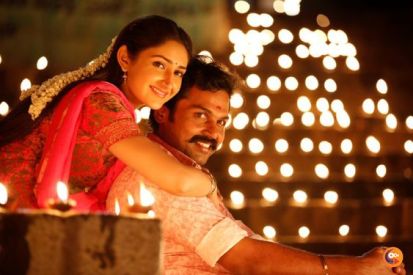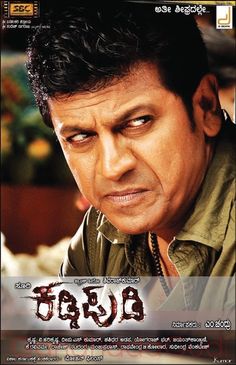
Vijay Chandar’s latest film starts out as a spoof comedy, but ends up as a fairly run-of-the-mill mass entertainer by way of a tired romance and routine ‘villain versus the villagers’ plot. Vijay Sethupathi is always watchable, even in this clichéd action adventure, but the rest of the cast get short-changed by the screenplay, having little to do except either adore or loathe the lead character. There is plenty of action, comedy and even Vijay Sethupathi dancing, but by the end there really is little that makes Sangathamizhan stand out from the rather large pool of similar films.
The opening scene of the film typifies much of the first half. It’s a jumble of mass action and hero-centric plot with a mixed bag of comedy that generally works better than the dramatic dialogue. As aspiring actor Murugan, Vijay Sethupathi has a classic hero entrance before single-handedly reducing a gang of villains to groaning bodies on the floor, while his friend Soori (Soori) cracks a few jokes and performs the usual slapstick side-kick role. It works to some extent as neither Vijay nor Soori seem to be taking any of the dialogue seriously and there are a lot of sideways glances and self-referential jokes in the opening sequences. But the inclusion of a college girl who needs to be rescued from rape, some tasteless jokes about a group of prostitutes and rather humdrum action make this rather more cringeworthy than it needed to be, particularly for the start of the film.
The first half also includes a woeful romance with a truly terrible introduction scene for Kamalini (Raashi Khanna). Murugan crashes Kamalini’s birthday party and then proceeds to scold her for being so generous as to provide him with a free drink at the bar. Somehow this is supposed to make her intrigued by Murugan rather than acting as most women would in this situation and just calling for the bouncer to kick him out of the nightclub. At no point does the love affair between the rich industrialist’s daughter and out-of-work actor seem plausible despite the clichéd and formulaic development of the relationship. The only good thing about their romance is the inclusion of the upbeat and jaunty Kamala (which features men in colourful tutus as backing dancers), even though it doesn’t fit into the narrative at all. In fact, generally the music from Viviek-Mervin is excellent throughout, while the lyrics are beautifully translated by rekhs, who doesn’t just translate the words but makes the lyrics rhyme and scan perfectly. Why doesn’t everyone do this instead of providing literal translations that make absolutely no sense at all?
The plot begins with a courtroom scene where a group of villagers are trying to prevent a copper processing plant from opening in their area. The land appears to have been acquired illegally and for a change the judge seems to be on the villagers’ side, giving the developer just a few weeks to come up with evidence to prove that the factory won’t be a health risk to the villagers. This all becomes much clearer in the second half, which moves into flashback mode to explain the fight between the owner of the copper factory, Kamalini’s father (Ravi Kishan) and the village headman Devarajan (Nassar). Also drawn into the fight is the local politician (Ashutosh Rana) and the rest of Devraj’s family, including his son Sangathamizhan (Vijay Sethupathi).
The tone of the second half is much darker than the first, and from a frivolous romance comedy, it changes into a more dramatic action film. This disconnect between the two halves of the film is jarring as the shift happens suddenly (there is no interval given in Australia) and the mood change is relatively extreme. Despite this, the second half is actually significantly better since it also includes Nivetha Pethuraj as Thenmozhi, Thamizhan’s romantic interest. Thenmozhi is a better realised character than Kamalini, despite her short time on-screen, with sharper dialogues and actions that actually make sense. Nivetha also has a good on-screen chemistry with Vijay in the romantic scenes between the two characters, which is a significant improvement on the lacklustre interactions he has with Raashi Khanna in the first half. The love story here is also more plausible, making me wonder why so much time was wasted earlier in the film, when the second half has a more convincing story, sharper action and generally improved performances from the entire cast. The main downside is Ravi Kishan’s rather anaemic villain who just doesn’t seem evil or ruthless enough, and Kamalini’s rather bizarre justification for accepting her father’s final fate.
The glue that manages to hold the entire film together (just) is Vijay Sethupathi and his frequent knowing nods to the camera seem to signify that he finds the entire story just as ridiculous as the audience. At times the film dips closely towards satire and throughout the first half I kept thinking that Vijay Chandar was trying to poke fun at the mass genre. But then the second half moves quickly towards more serious topics and the jokes dry up, along with Soori’s virtual disappearance from the screen as the film moves into more straight-up action territory. It doesn’t quite gel there either however as there is too much baggage hanging around from the first half that acts as a distraction. The two characters, Murugan and Thamizhan are also very similar which further undermines the dramatic ‘reveal’ of the finale. The positives are the music, Vijay Sethupathi and rekhs excellent subtitles, but otherwise this is a rather pedestrian and predictable outing that is really one only for fans.





















































